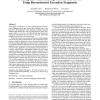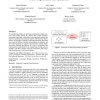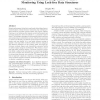107
click to vote
PLDI
2011
ACM
14 years 17 days ago
2011
ACM
In this paper we propose Recon, a new general approach to concurrency debugging. Recon goes beyond just detecting bugs, it also presents to the programmer short fragments of buggy...
PLDI
2011
ACM
14 years 17 days ago
2011
ACM
For more than thirty years, the parallel programming community has used the dependence graph as the main abstraction for reasoning about and exploiting parallelism in “regular�...
PLDI
2011
ACM
14 years 17 days ago
2011
ACM
We consider the problem of specifying combinations of data structures with complex sharing in a manner that is both declarative lts in provably correct code. In our approach, abst...
107
click to vote
PLDI
2011
ACM
14 years 17 days ago
2011
ACM
Software modifications are often systematic—they consist of similar, but not identical, program changes to multiple contexts. Existing tools for systematic program transformati...
108
click to vote
PLDI
2011
ACM
14 years 17 days ago
2011
ACM
Current proposals for concurrent shared-memory languages, including C++ and C, provide sequential consistency only for programs without data races (the DRF guarantee). While the i...
PLDI
2011
ACM
14 years 17 days ago
2011
ACM
119
click to vote
PLDI
2011
ACM
14 years 17 days ago
2011
ACM
MATLAB is an array language, initially popular for rapid prototyping, but is now being increasingly used to develop production code for numerical and scientific applications. Typ...
103
click to vote
PLDI
2011
ACM
14 years 17 days ago
2011
ACM
Translation validators are static analyzers that attempt to verify that program transformations preserve semantics. Normalizing translation validators do so by trying to match the...
PLDI
2011
ACM
14 years 17 days ago
2011
ACM
Exploiting today’s multiprocessors requires highperformance and correct concurrent systems code (optimising compilers, language runtimes, OS kernels, etc.), which in turn requir...
PLDI
2011
ACM
14 years 17 days ago
2011
ACM



